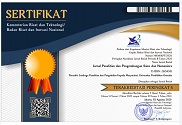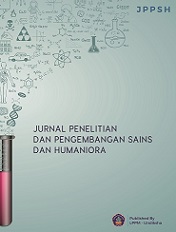Principal's Leadership Style and Its Relevance to Teacher Performance
DOI:
https://doi.org/10.23887/jppsh.v6i1.45567Keywords:
Style, Leadership, Performance, Teacher,Abstract
Berbagai permasalahan dalam dunia pendidikan mengenai mutu dan mutu pendidikan untuk meningkatkan kinerja guru dipengaruhi oleh kepemimpinan kepala sekolah. Penelitian ini bertujuan untuk menganalisis gaya kepemimpinan kepala sekolah dan relevansinya dengan kinerja guru. Jenis penelitian ini termasuk penelitian lapangan, termasuk penelitian kualitatif deskriptif. Penelitian ini menggunakan pendekatan kualitatif. Metode yang digunakan untuk mengimpulkan data yaitu observasi dan wawancara. Teknik analisis data yang digunakan adalah analisis deskriptif kualitatif. Hasil penelitian pengaruh gaya kepemimpinan kepala sekolah terhadap kinerja guru bahwa kepemimpinan kepala sekolah termasuk dalam kategori sangat kuat. Hasil penelitian ini menunjukkan bahwa gaya kepemimpinan yang diterapkan instansi adalah gaya kepemimpinan demokratis. Dalam uji hipotesis menunjukkan bahwa gaya kepemimpinan berpengaruh positif dan signifikan terhadap kinerja guru. Hal tersebut menjelaskan bahwa semakin demokratis gaya kepemimpinan yang diterapkan, maka akan semakin tinggi kinerja gurunya. Gaya kepemimpinan tersebut memiliki perilaku senang menerima saran, pendapat, dan kritikan dari bawahannya. Gaya keemimpinan yang perlu dipertahankan, terutama dalam aspek melibatkan guru dalam hal pengambilan keputusan dan perlu meningkatkan aspek pimpinan harus memerhatikan kepentingan guru maupun kepentingan instansi.
References
Agustini, D., Lian, B., & Sari, A. P. (2020). School’S Strategy for Teacher’S Professionalism Through Digital Literacy in the Industrial Revolution 4.0. International Journal of Educational Review, 2(2), 160–173. https://doi.org/10.33369/ijer.v2i2.10967.
AlAjmi, M. K. (2022). The Impact ofDdigital leadership on teachers’ technology integration during the COVID-19 pandemic in Kuwait. International Journal of Educational Research, 101928. https://doi.org/10.1016/j.ijer.2022.101928.
Andini, D. M., & Supardi, E. (2018). Kompetensi Pedagogik Guru terhadap Efektivitas Pembelajaran dengan Variabel Kontrol Latar Belakang Pendidikan Guru. Jurnal Pendidikan Manajemen Perkantoran, 3(1), 148. https://doi.org/10.17509/jpm.v3i1.9450.
Ariyani, D. (2021). Principal’s Innovation and Entrepreneurial Leadership to Establish a Positive Learning Environment. European Journal of Educational Research, 10(1), 63–74. https://doi.org/10.12973/eu-jer.10.1.63.
Balyer, A. (2019). Educational Leaders and Teacher leaders’ Roles in Humanizing Education. Elementary Education Online, 18(3). https://doi.org/10.17051/ilkonline.2019.611500.
Battisti, S., Agarwal, N., & Brem, A. (2022). Creating New Tech Entrepreneurs with Digital Platforms: Meta-organizations for Shared Value in Data-Driven Retail Ecosystems. Technological Forecasting and Social Change, 175. https://doi.org/10.1016/j.techfore.2021.121392.
Bintara, B., Mulawarman, W. G., & Azainil, A. (2021). Effect of Principal Leadership Style Women’s and Cultural Organization of Work Ethos Teachers. Aksara: Jurnal Ilmu Pendidikan Nonformal, 7(3), 1045. https://doi.org/10.37905/aksara.7.3.1045-1062.2021.
Cahyaningrum, R. (2020). Kontribusi Kemampuan Manajerial Kepala Sekolah, Motivasi Guru, dan Lingkungan Kerja terhadap Kinerja Guru Sekolah Dasar. Media Manajemen Pendidikan, 3(1), 100. https://doi.org/10.30738/mmp.v3i1.4633.
Effendi, R., Lian, B., & Sari, A. P. (2020). Principal Leadership Policy in Improving Instructional Quality. International Journal of Progressive Sciences and Technologies (IJPSAT), 368–375. https://doi.org/10.52155/ijpsat.v22.1.2086.
Elpisah, E., & Hartini, H. (2019). Principal Leadership Style and Its Effect on Teachers Performance. Jurnal Aplikasi Manajemen, 17(3), 506–514. https://doi.org/10.21776/ub.jam.2019.017.03.15.
Fatah, R. A., & Komariah, A. (2020). Principal Leadership for Private Schools Improvement in the Industrial Revolution Era 4.0. International Conference on Research of Educational Administration and Management, 400(Icream 2019), 122–125. https://doi.org/10.2991/assehr.k.200130.152.
Hasanah, M. L., & Kristiawan, M. (2019). Supervisi Akademik dan Bagaimana Kinerja Guru. Tadbir : Jurnal Studi Manajemen Pendidikan, 3(2), 97–112. https://doi.org/10.29240/jsmp.v3i2.1159.
Hastuti, T., Hastuti, T., Kristiawan, M., & Mulyadi, M. (2020). The Principal’s Leadership in Improving the Quality of Education. International Journal of Progressive Sciences and Technologies, 22(1), 314–320. https://doi.org/10.26858/ja.v8i1.19126.
Kartini, D., Kristiawan, M., & Fitria, H. (2020). The Influence of Principal’s Leadership, Academic Supervision, and Professional Competence toward Teachers’ Performance. International Journal of Progressive Sciences and Technologies, 20(1), 156–164. https://doi.org/10.52155/ijpsat.v20.1.1730.
Kaso, N., Mariani, M., Ilham, D., Firman, F., Aswar, N., & Iksan, M. (2021). The Principal’s Leadership: How to Improve the Quality of Teaching and Learning Process in State Junior High School of Luwu. Jurnal Ad’ministrare, 8(1), 49. https://doi.org/10.26858/ja.v8i1.19126.
Lukman, L., Lian, B., & Sari, A. P. (2020). The Influence of Principal’s Leadership and Work Motivation toward Teacher’s Performance. International Journal of Progressive Sciences …, 22, 378. https://doi.org/10.52155/ijpsat.v22.1.2087.
Maryati, E., Fitria, H., & Rohana, R. (2020). The Influence of Principal’s Leadership Style and Organizational Culture on Teacher’s Performance. Journal of Social Work and Science Education, 1(2), 127–139. https://doi.org/10.52690/jswse.v1i2.38.
Navaridas-Nalda, F., Emeterio, M. C.-S., Fernández-Ortiz, R., & Arias-Oliva, M. (2020). The Strategic Influence of School Principal Leadership in The Digital Transformation of Schools. Computers in Human Behavior, 112. https://doi.org/10.1016/j.chb.2020.106481.
Niemann, C. C., Mai, R., & Dickel, P. (2022). Nurture or Nature? How Organizational and Individual Factors Drive Corporate Entrepreneurial Projects. Journal of Business Research, 140. https://doi.org/10.1016/j.jbusres.2021.11.065.
Patoko, N., & Yazdanifard, R. (2014). The Impact of Using Many Jargon Words, while Communicating with The Organization Employees. American Journal of Industrial and Business Management, 04(10), 567–572. https://doi.org/10.4236/ajibm.2014.410061.
Prihatini, D., Arafat, Y., & Mulyadi, M. (2021). The Influence of Organizational Culture and Principal Leadership towards Teacher’s Performance. Journal of Social Work and Science Education, 1(3), 204–213. https://doi.org/10.52690/jswse.v1i3.107.
Priyono, B. H., Qomariah, N., & Winahyu, P. (2018). Pengaruh Gaya Kepemimpinan, Motivasi Guru dan Lingkungan Kerja Fisik terhadap Kinerja Guru SMAN 1 Tanggul Jember. Jurnal Manajemen Dan Bisnis Indonesia, 4(2), 144. https://doi.org/10.32528/jmbi.v4i2.1758.
Ristianey, F., Harapan, E., & Destiniar, D. (2020). Pengaruh Sertifikasi Guru dan Motivasi Kerja terhadap Kinerja Guru. JMKSP (Jurnal Manajemen, Kepemimpinan, Dan Supervisi Pendidikan), 6(1), 1310–1317. https://doi.org/10.31851/jmksp.v6i1.3950.
Sahara, B. (2020). Relationship of Principal Leadership Style, Teacher Work Culture, Teacher Competency, Teacher Job Satisfaction and Performance of Special School Teachers in Banjarbaru City. Journal of K6 Education and Management, 3(4), 505–518. https://doi.org/10.11594/jk6em.03.04.10.
Sappaile, N. (2017). Pengaruh Kompetensi Pedagogik, Kompetensi Profesional, dan Sikap Profesi Guru tehadap Kinerja Penilaian Guru di Sekolah Dasar. Jurnal Teknologi Pendidikan, 19(1). https://doi.org/10.21009/jtp.v19i1.5334.
Sergeeva, N., & Kortantamer, D. (2021). Enriching The Concept of Authentic Leadership in Project-Based Organisations through The Lens of Life-Stories and Self-Identities. International Journal of Project Management, 39(7). https://doi.org/10.1016/j.ijproman.2021.09.001.
Suardana, I. P., Yudana, M., & Agung, A. A. G. (2018). Kontribusi Gaya Kepemimpinan, Kompetensi Profesional dan Kompetensi Manajerial Kepala Sekolah terhadap Motivasi Kerja (Studi Tentang Persepsi Guru SMAN 1 Mengwi). Jurnal Administrasi Pendidikan Indonesia, 9(1), 55–66. https://doi.org/10.23887/japi.v9i1.2736.
Sugiyono. (2016). Metode Penelitian Kualitatif, Kuantitatif, dan R&D. Alfabeta.
Suprapto, S., Hamzah, S., Yulistio, D., & Susetyo, S. (2021). The Relationship Organizational Culture, Motivation, Resilience and Leadership of Principals with the Work Ethic of Indonesian Language Teachers. Jurnal Iqra’ : Kajian Ilmu Pendidikan, 6(1), 192–210. https://doi.org/10.25217/ji.v6i1.1293.
Sya’roni, Herlambang, T., & Cahyono, D. (2018). Dampak Motivasi, Disiplin Kerja dan Kepemimpinan Kepala Sekolah terhadap Kinerja Guru. Jurnal Sains Manajemen Dan Bisnis Indonesia, 8(2), 131–147. https://doi.org/10.32528/jsmbi.v8i2.1785.
Wang, X., Liu, Z., Wen, X., & Xiao, Q. (2022). An Implicit Leadership Theory Lens on Leader Humility and Employee Outcomes: Examining Individual and Organizational Contingencies. Tourism Management, 8. https://doi.org/10.1016/j.tourman.2021.104448.
Waruwu, M. (2020). On The Job Skill-Based Servant Leadership Training Model for Principal Effectiveness. International Journal of Psychosocial Rehabilitation, 24(5), 3270–3279. https://doi.org/10.37200/ijpr/v24i5/pr202035.
Downloads
Published
Issue
Section
License
Copyright (c) 2022 Khofiyah Khofiyah

This work is licensed under a Creative Commons Attribution-ShareAlike 4.0 International License.
Authors who publish with the Jurnal Penelitian dan Pengembangan Sains dan Humaniora agree to the following terms:
- Authors retain copyright and grant the journal the right of first publication with the work simultaneously licensed under a Creative Commons Attribution License (CC BY-SA 4.0) that allows others to share the work with an acknowledgment of the work's authorship and initial publication in this journal.
- Authors are able to enter into separate, additional contractual arrangements for the non-exclusive distribution of the journal's published version of the work (e.g., post it to an institutional repository or publish it in a book), with an acknowledgment of its initial publication in this journal.
- Authors are permitted and encouraged to post their work online (e.g., in institutional repositories or on their website) prior to and during the submission process, as it can lead to productive exchanges, as well as earlier and greater citation of published work. (See The Effect of Open Access)









